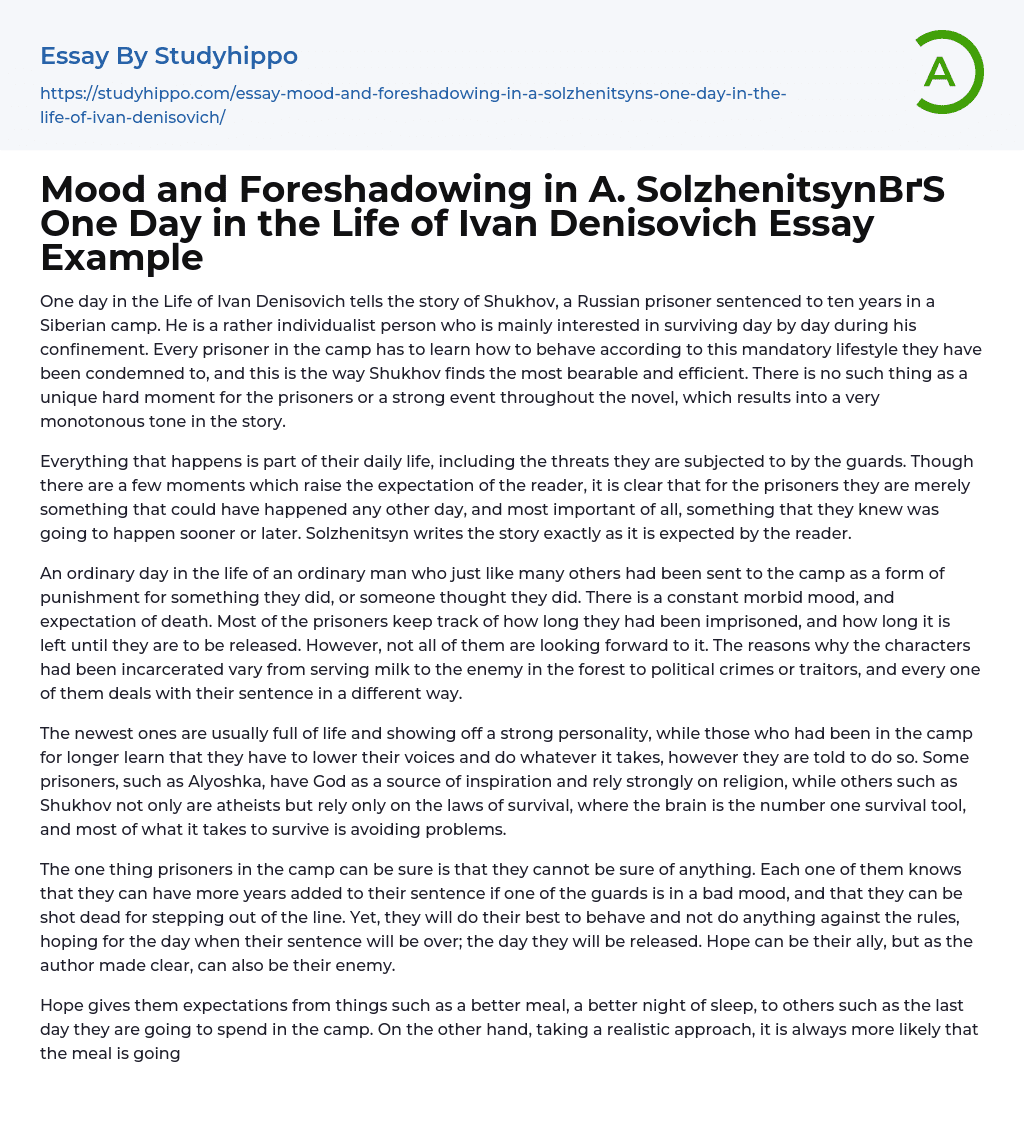

Mood and Foreshadowing in A. Solzhenitsyn??S One Day in the Life of Ivan Denisovich Essay Example
Everything that happens is part of their daily life, including the threats they are subjected to by the guards. Though there are a few moments which raise the exp
...ectation of the reader, it is clear that for the prisoners they are merely something that could have happened any other day, and most important of all, something that they knew was going to happen sooner or later. Solzhenitsyn writes the story exactly as it is expected by the reader.
An ordinary day in the life of an ordinary man who just like many others had been sent to the camp as a form of punishment for something they did, or someone thought they did. There is a constant morbid mood, and expectation of death. Most of the prisoners keep track of how long they had been imprisoned, and how long it is left until they are to be released. However, not all of them are looking forward to it. The reasons why the characters had been incarcerated vary from serving milk to
the enemy in the forest to political crimes or traitors, and every one of them deals with their sentence in a different way.
The newest ones are usually full of life and showing off a strong personality, while those who had been in the camp for longer learn that they have to lower their voices and do whatever it takes, however they are told to do so. Some prisoners, such as Alyoshka, have God as a source of inspiration and rely strongly on religion, while others such as Shukhov not only are atheists but rely only on the laws of survival, where the brain is the number one survival tool, and most of what it takes to survive is avoiding problems.
The one thing prisoners in the camp can be sure is that they cannot be sure of anything. Each one of them knows that they can have more years added to their sentence if one of the guards is in a bad mood, and that they can be shot dead for stepping out of the line. Yet, they will do their best to behave and not do anything against the rules, hoping for the day when their sentence will be over; the day they will be released. Hope can be their ally, but as the author made clear, can also be their enemy.
Hope gives them expectations from things such as a better meal, a better night of sleep, to others such as the last day they are going to spend in the camp. On the other hand, taking a realistic approach, it is always more likely that the meal is going to be worse and they
will have fishes eyes if lucky, that the hours of sleep will not be enough, and that the last day they are going to spend in the camp will never come, unless they are not planning to stay alive. Ivan Denisovich Shukhov is a man who lost hope long ago.
By his statement in the beginning of the novel, while cleaning the floor of the guard’s office, he makes it clear that he keeps resentment from when he was taken away from his wife, and that he misses the life he had before, as well as emphasis the fact that he has no further expectations of getting everything he lost back someday. He knows that, as a prisoner once said, when he is done with ten years he can easily be told: Here’s another ten for you. Shukhov came to learn in the camp that surviving is a victory every day, and the future is today. To him, this is what truly matters.
- 1984 essays
- A Farewell to Arms essays
- A Good Man Is Hard to Find essays
- A Hanging essays
- A Lesson Before Dying essays
- A Long Way Gone essays
- A Rose For Emily essays
- A Separate Peace essays
- A Tale Of Two Cities essays
- A Very Old Man With Enormous Wings essays
- Adventures Of Huckleberry Finn essays
- Alice in Wonderland essays
- All Quiet on The Western Front essays
- Allegory of the Cave essays
- An occurrence at owl creek bridge essays
- Animal Farm essays
- Anthem essays
- Antigone essays
- Arthur Conan Doyle essays
- As I Lay Dying essays
- Atticus Finch essays
- Barn Burning essays
- Battle Royal essays
- Beauty and The Beast essays
- Beloved essays
- Boo Radley essays
- Brave New World essays
- Candide essays
- Castle essays
- Characters In Hamlet essays
- Characters In Romeo And Juliet essays
- Christmas carol essays
- Chronicle of a Death Foretold essays
- Cinderella essays
- Crime and Punishment essays
- Daisy Miller essays
- Death of a Salesman American Dream essays
- Desdemona essays
- Diary Of A Wimpy Kid essays
- Dracula essays
- Dubliners essays
- Emma essays
- Ender'S Game essays
- Ethan Frome essays
- Eveline essays
- Fahrenheit 451 essays
- First-Person Narrative essays
- Fish Cheeks essays
- Frankenstein essays
- Genesis essays



